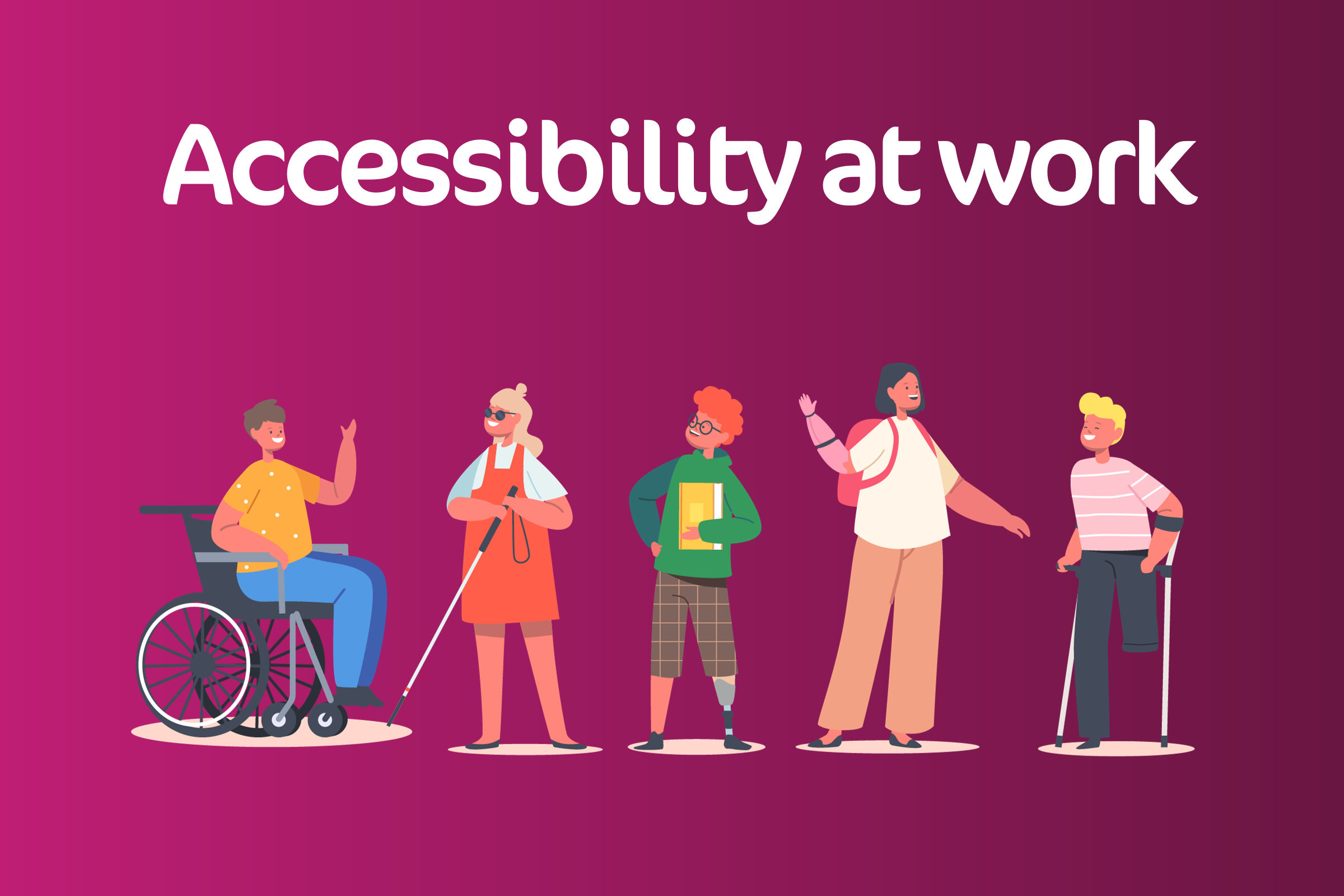Under the Equality Act 2010, and the Disability Discrimination Act 1995 in Northern Ireland, employers have a duty to make reasonable adjustments to ensure employees with disabilities are not disadvantaged when doing their jobs.
Employers are also legally required to conduct display screen equipment (DSE) tests when requested and pay for them as using DSE can lead to tired eyes, discomfort, temporary short-sightedness, and headaches. If the test highlights you need special glasses for DSE work, your employer must pay for the prescription (if an ordinary prescription is suitable, your employer does not have to pay).
Accessibility enables people with disabilities to actively participate at work, and in wider society. By focusing on accessibility, workplaces can:
- Encourage inclusive behaviour around disabilities
- Discourage disability discrimination
- Reduce reasonable adjustment requests
- Improve employee morale
- Highlight the importance of equality
- Ensure everyone feels supported
- Changes can be made with little or no cost
From adapting the workplace and environment, modifying, or acquiring specialist equipment, providing training, and adjusting working patterns, there is plenty that can be done to make workplaces more accessible. This can include:
- Creating or reserving spaces near to the entrance of the workplace for people with limited mobility
- Step-free access to the building
- Installing disability access such as automatic doors, ramps, and lifts
- Move employees with mobility disabilities to the ground floor
- Having braille on doors and signs in the workplace
- Accessible toilets
- Ensuring workspaces, desks and communal areas are low enough for everyone to access
- Changing workspace layout to ensure wheelchair users can access everywhere they need to
- Ensuring employees have access to specialist equipment to support them with their disability such as hearing loops, height-adjusting desks, ergonomic equipment, or screen readers.
- Provide equality, diversity, and inclusion (EDI) and disability awareness training.
- Subtitling video content
- Ensuring any online imagery includes ALT descriptions (this helps screen-reading tools to describe imagery to visually impaired readers).
- Adjust working patterns, including working from home, or flexible/hybrid working
- By creating an accessibility policy
Accessibility is not just about the physical workplace and should also encompass any employee learning or training.
If you have a learning disability, or find the method of training or learning difficult, your employer should look at how they could offer the training differently such as practical training, or training in a team. This is classed as a reasonable adjustment.
To ensure that training and learning works for everyone, your employer should review their training policy to remove any barriers and ensure that everyone has access to training that works for them.
It is important to get the conversation started about accessibility at work. What is accessible for one person might not be accessible for another – there is no one-size-fits-all solution to accessibility as everyone accesses things differently. Therefore, it is important that employers talk to employees regularly to find out where barriers are, and what they can do to help.
No one must tell their employer that they are disabled, however when they do, their employers have a legal duty to support them, and to take reasonable steps to make sure the workplace is accessible. In addition, by talking to your employer about your disability, you can raise awareness of the issues disabled workers experience and avoid situations where your employer doesn’t know how to support you or your accessibility requirements. We would recommend talking to your employer about your disability if:
- You need support
- You have an accessibility issue
- You envision there will be issues down the line
It is unlawful for your employer to discriminate against you for being disabled or having an accessibility requirement. If you believe you will be discriminated against for talking about your accessibility requirements, please speak to your Community Equalities Rep, or contact us directly for support.
By openly talking about accessibility requirements, employers are also helping to create an inclusive workplace environment for workers with disabilities, which will also help to tackle disability discrimination.
Some workplaces will also operate disability networks where employees can share experiences and raise concerns around accessibility.
There is not a lot of choice when using public sector websites or mobile apps, and with 1 in 5 people in the UK having a disability, it is imperative that they work for everyone.
Unfortunately, many public sector websites and mobile apps don’t currently meet accessibility requirements, meaning people with disabilities struggle to use them, or can’t use them at all.
If a public sector website or app does not meet accessibility requirements, the organisation may be breaking the law under the Public Sector Bodies (Websites and Mobile Applications) (No. 2) Accessibility Regulations 2018.
At Community, we’re proud to champion our members with disabilities, and encourage all our members, both abled and disabled to call on making their workplace more accessible.
You can visit our equalities hub to access a range of topics on disability rights, awareness and support around disability discrimination, mental health, reasonable adjustments, inclusivity and more. All these resources are designed to not only support Community members with disabilities, but also to raise awareness amongst non-disabled people on the issues that disabled workers experience daily.
If you are passionate about fighting for better rights and recognition for people with disabilities, click here to find out more about becoming a Community Equalities Rep. Full training and support is provided.
Our equalities team can also help to get the conversation started around an accessibility policy at work. Get in touch at equalities@community-tu.org for further information and support.







